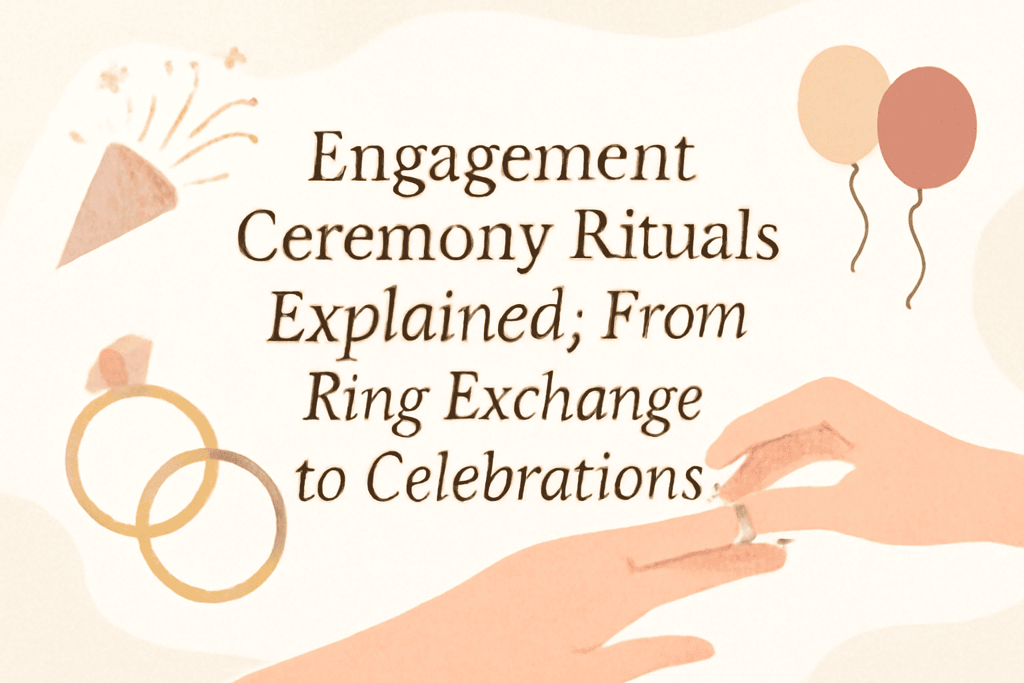Engagement Ceremony Rituals Explained: From Ring Exchange to Celebrations


Introduction
An engagement ceremony is more than just a sparkling ring on the finger—it’s the beginning of two lives coming together. This milestone represents love, trust, and the official bonding of families. For many, it’s the first big celebration before the wedding itself, filled with joy, tradition, and heartfelt moments.
The Significance of Engagement Rituals
Engagements are not just social events—they symbolize a promise. While traditions vary across cultures, the core message remains the same: two people are committing to a shared journey. In today’s world, couples blend old traditions with modern elements, creating ceremonies that reflect both heritage and individuality.
Pre-Engagement Preparations
Planning starts well before the big day. Families sit together to fix an auspicious date, finalize the venue, and prepare the guest list. This step is crucial because it sets the tone of the ceremony. Both families also discuss attire, gifts, and sometimes even future wedding details during these preparations.
Welcoming Rituals
As the guests arrive, warmth fills the atmosphere. Traditional greetings like tilak, aarti, or flower garlands may be offered, depending on culture. Families often exchange sweets or small tokens, marking the beginning of a joyous bond.
The Ring Exchange Ceremony
The highlight of the event—the ring exchange. Rings symbolize eternity and the unbroken circle of love. While the tradition has ancient roots, modern couples personalize it with engraved bands, gemstone rings, or even surprise proposals during the ceremony.
Blessings from Elders
After the exchange, elders shower blessings on the couple. This ritual holds deep emotional value, as it reflects the acceptance of the relationship. Grandparents and senior family members often perform symbolic gestures like placing hands on the couple’s heads or reciting prayers for prosperity.
Exchange of Tokens and Gifts
Both families often exchange gifts as a gesture of goodwill. Traditionally, this might include clothing, jewelry, or sweets. Today, however, the gifts have expanded to include personalized hampers, gadgets, or even vacation packages.
Religious and Cultural Variations
Hindu Traditions:
Include rituals like Ganesh puja and tilak ceremonies.
Christian Traditions:
Often called a betrothal, it includes prayers and blessings at the church.
Muslim Traditions:
Known as Mangni, it usually involves a formal proposal, prayers, and exchange of rings.
Regional Touches:
For example, South Indian engagements include traditional music, while North Indian ones may have mehendi or dance functions.
Engagement Pooja or Prayers
For many, spiritual rituals mark the official beginning of the ceremony. Some families prefer elaborate prayers, while others keep it simple with just a few chants or blessings. It adds a sacred layer to the festivities.
Introduction of Families
Engagements are not only about the couple but also about families bonding. The event often includes formal introductions, light-hearted conversations, and creating a foundation for future relationships.
Entertainment and Celebrations
What’s a celebration without fun? Engagements often feature live music, DJ nights, dance performances, or even games to keep guests entertained. Couples also plan fun activities like trivia about their love story or surprise dance numbers.
Engagement Feast
Food is central to any celebration. Traditional spreads might include regional delicacies, while modern couples prefer fusion buffets with a mix of cuisines. The meal becomes an opportunity for guests to mingle and celebrate.
Photography and Videography Ritual
No engagement today is complete without cameras flashing. Professional photographers capture candid smiles, ring exchange moments, and family portraits. Social media has also added a twist, with hashtags and instant uploads trending everywhere.
Modern Additions to Engagements
From themed decorations like “rustic romance” or “royal elegance” to personalized vows, couples today make their engagements unique. Some even prepare video montages or write speeches to make the event more personal.
Conclusion
Engagement rituals beautifully weave together tradition, family, and love. While customs may differ across cultures, the essence is universal—it’s a promise of togetherness. Whether you prefer a traditional puja or a modern cocktail party, what truly matters is the joy and unity these ceremonies bring.
FAQs
Q1: Where can I find beautiful invitations for engagement ceremonies?
Invitoon offers a stunning collection of engagement ceremony invitations that perfectly capture your celebration’s spirit and make your event truly memorable.
Q2: How long does a typical engagement ceremony last?
It usually lasts 3–5 hours, depending on the rituals and celebrations planned.
Q3: Can couples customize engagement rituals?
Yes! Many couples add modern touches like speeches, games, or themed décor while still respecting traditions.
Q4: Is an engagement ceremony legally binding?
No, it’s a cultural or religious ritual. The legal binding comes only after marriage registration.
Q5: What’s the most important part of the engagement ceremony?
While the ring exchange is often the highlight, the blessings of elders and unity of families hold the deepest meaning.
Connect
Explore our customizable digital invitations today!
invitoon.store@gmail.com
+91 9243781585
© 2025. All rights reserved. Invitoon
